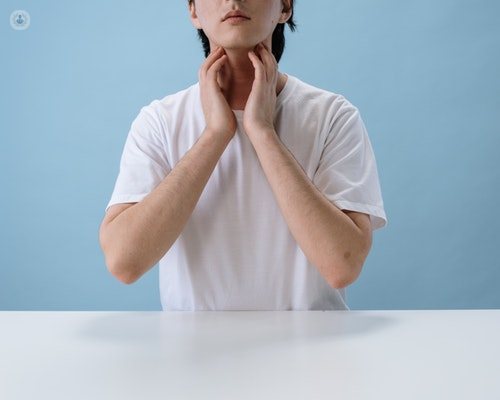Oesophagitis
Dr Amit Gera - Gastroenterology
Created on: 11-13-2012
Updated on: 03-30-2023
Edited by: Carlota Pano
What is oesophagitis?
The oesophagus is part of the digestive system and it connects the mouth to the stomach. The mouth and the oesophagus are separated by cardia, which is a type of valve that aims to prevent gastric juices going up to the mouth once they have passed through the stomach.
The term oesophagitis is used when the oesophageal mucus is inflamed, with an additional layer covering it. The mucus quite often becomes irritated or inflamed.

Oesophagitis prognosis
Oesophagitis may be caused by several factors, most of which respond well to treatment. When oesophagitis is not treated, it can cause structural changes to the oesophagus which interrupt its normal function.
Some complications may include:
- Tearing of the oesophageal tissue
- Difficulty swallowing
- Oesophageal scarring
- Stenosis (narrowing) of the oesophagus
- Barrett’s oesophagus: If gastroesophageal reflux goes untreated for many years then it may cause Barrett’s oesophagus, which could in turn lead to oesophageal cancer.
What are the symptoms of oesophagitis?
Oesophagitis symptoms include:
- Difficulty swallowing
- Pain when swallowing
- Sharp pain when eating
- Food getting trapped in the oesophagus
- Heartburn, acid reflux
- Hoarseness
- Sore throat
- Cough
- Acid regurgitation
Many oesophagitis symptoms are caused by a variety of symptoms that affect the digestive tract. However, the patient should see a specialist in the following cases:
- Symptoms that last several days
- Symptoms that don’t improve even with antacids
- Symptoms that are making eating difficult
- Symptoms that come with a headache, muscle pain, or a fever
- Chest pain that occurs for several minutes
- There is a history of heart problems and the patient has pain or discomfort in the chest
- There is pain or discomfort when trying to eat
- Shortness of breath
- Intense vomiting which may be yellowish or greenish in colour and contain blood
Tests for oesophagitis
When the patient sees the specialist, they will ask a series of questions and carry out a physical exam.
There are certain tests to detect oesophagitis:
- Barium X-ray: The patient ingests some barium or takes a pill that contains it. The barium coats the mucus in the oesophagus and stomach, making the organs visible. It enables certain changes or conditions to be seen.
- Endoscopy: A large, thin tube with a camera on the end is inserted. This is useful for detecting any unusual activity in the oesophagus.
- Laboratory tests: During an endoscopy, samples are taken and sent to a lab for analysis. They can be used to diagnose a bacterial, viral, or yeast infection, white blood cells, or identify potential abnormal cells that could indicate that the issue is due to become oesophageal cancer.
What causes oesophagitis?
There are risk factors that increase the chances of having gastroesophageal reflux.
They include:
- Eating just before going to sleep
- Excessive consumption of alcohol, chocolate, caffeine, or mint flavours
- Eating big portions of greasy food
- Spicy food
- Smoking
- Obesity or being overweight
- Hiatus hernia
There are many causes for oesophagitis:
- Reflux oesophagitis: This happens when there is an issue in the lower oesophageal sphincter, which is what ensures that the acid in the stomach is far away from the oesophagus. If this doesn’t work properly and it opens when it shouldn’t or doesn´t close, then the content of the stomach returns to the oesophagus. This is known as gastroesophageal reflux. This is a common and continuous disease. The main issue is that it could become chronic, damaging oesophageal tissues.
- Eosinophilic oesophagitis: Eosinophils are white blood cells that play a crucial role in allergic reactions. Eosinophilic oesophagitis happens when there is a concentration of white blood cells in the oesophagus in response to an allergen. Some foods that can cause it include; milk, eggs, wheat, beef, and rye.
- Lymphocytic oesophagitis: An uncommon oesophagus disorder in which there is a high number of lymphocytes in the oesophageal lining.
- Drug-induced esophagitis: Some medications can cause tissue damage - an example of this is taking a pill without water. The medications may be anti-inflammatory painkillers, antibiotics, potassium chloride, bisphosphonates, or quinidine.
- Infectious oesophagitis: A bacterial or viral infection in the oesophagus can cause this, although it is very rare.
How can oesophagitis be prevented?
The simplest way to prevent oesophagitis is to stop or reduce consumption of certain foods and consume others which are healthier.
It is recommended to:
- Avoid eating big meals and those high in fat, particularly two or three hours before going to sleep. This is because fat is slow to digest and can cause reflux.
- Reduce or stop consuming caffeine and alcohol.
- Have a food schedule and try not to leave too much time between meals.
- Avoid lying down just after eating.
- Eat food high in fibre.
- Lose weight if needed.
What is the treatment for oesophagitis?
The treatment for oesophagitis mainly focuses on reducing symptoms and managing complications.
Reflux oesophagitis:
- Over the counter medications such as antacids, which are medicines that reduce or stop acid production
- Prescription medicines
- Surgery: Fundoplication can be used to improve oesophageal conditions. Part of the stomach is wrapped around the valve that separates the oesophagus and the stomach, strengthening the sphincter and preventing the acid from re-entering the oesophagus.
Eosinophilic oesophagitis:
- Proton pump inhibitors
- Steroids
- Stop eating the allergen (food) and elemental diets
Drug-induced oesophagitis: Treatment focuses on avoiding the medication that has caused the issue.
- An alternative medication will be recommended
- Take a liquid version of the medication
- Sit down for at least half an hour after taking the medication.
- The stomach can be expanded in cases where the narrowing is very bad. In order to do this, an endoscopic device is used. There are different kinds of endoscope - some are cone-shaped and widen little by little, and there are others where there is a balloon on the end that expands upon insertion.
What specialist should I see?
The specialists who study and treat oesophageal issues and digestive diseases are generally gastroenterologists.







